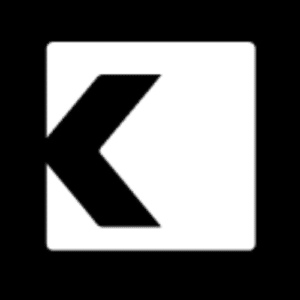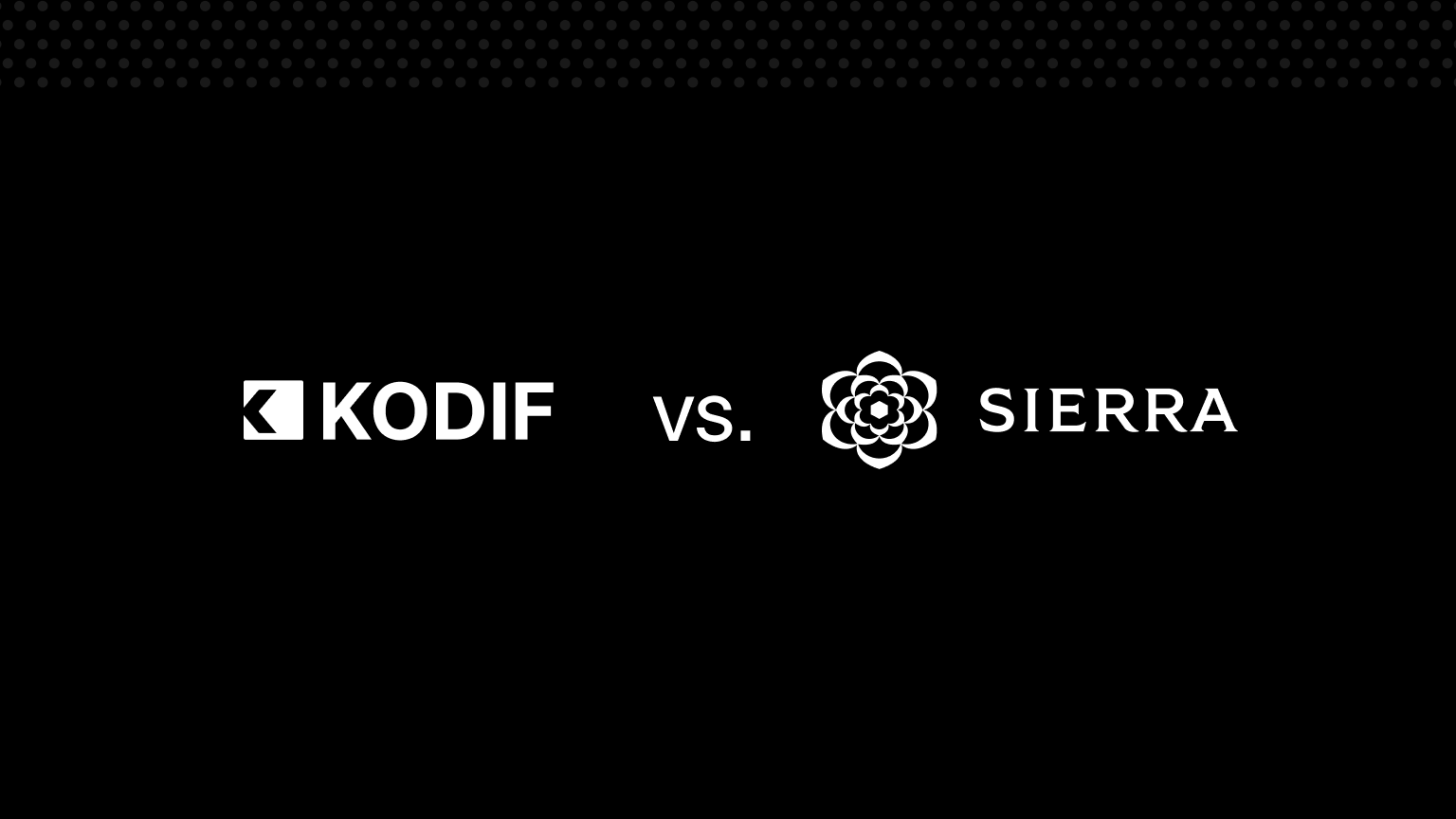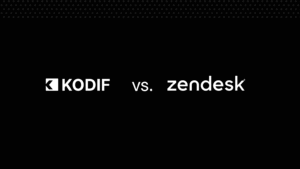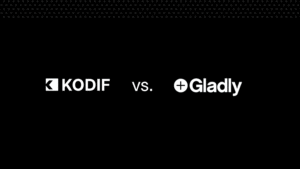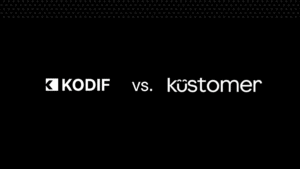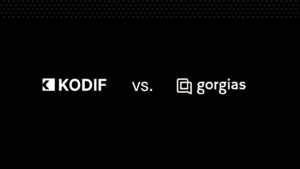The AI support space is full of options, but the reality is that not every platform is built for the same type of business. Two of the most talked-about players, Sierra and KODIF, represent very different approaches.
- Sierra is enterprise through and through: heavyweight funding, Silicon Valley pedigree, long deployments, and a professional-services-driven model.
- KODIF is ecommerce-first: vertical depth, rapid time to value, and automation that compounds outcomes across the entire customer journey.
If your goal is speed, revenue, and retention impact, the differences matter.
TL;DR
- Sierra: Enterprise-focused AI agents, designed for Fortune 500s, regulated industries, and long transformation projects. Requires forward deployed engineers, deployments take 6–9 months and rely on pro services.
- KODIF: Verticalized for ecommerce and DNVBs, with weeks to value and a proprietary Agentic AI stack that ties automation directly to conversions, retention, and customer lifetime value.
- Implementation reality: KODIF gets you live in weeks with your CX team in control. Sierra requires months of professional services and engineering resources.
Who Sierra is (and who they serve)
- Founders: Bret Taylor (ex-Salesforce co-CEO) and Clay Bavor (ex-Google VP).
- Funding: $635M raised; valuation $10B.
- Customers: Known logos include ADT and SiriusXM. Average client age ~15 years.
- Positioning: AI agents for customer service with enterprise-grade compliance and governance.
- Deployment model: Requires 6–9 months to implement, plus professional services teams for ongoing management.
- Strengths: Boardroom credibility, enterprise compliance, deep capital to fund R&D.
- Weaknesses: Long time to value, heavy services dependency, less focus on revenue-driving use cases.
What this means for your business
If you’re a Fortune 500 brand with regulatory requirements and 6-9 months to spare, Sierra’s model aligns with that structure. But for ecommerce brands that need to show ROI this quarter—not next year—the timeline alone becomes a dealbreaker.
Who KODIF is (and who we serve)
- Vertical depth: Purpose-built for ecommerce: subscriptions, returns, upsells, cart recovery, product discovery.
- Data flywheel: Pre-purchase + post-purchase engagement → richer data → better personalization → compounding ROI.
- Agentic AI stack: Proprietary automation engine with experimentation to continuously optimize for AOV, conversions, retention, and resolution rate (not just deflection).
- Deployment model: Weeks, not months. No engineers required.
- Integrations: 100+ ecommerce and product catalog systems (Shopify, Ordergroove, Recharge, Salesforce, payment platforms, ESPs).
- Strengths: Fast implementation, measurable business outcomes, ecommerce specialization.
- Weaknesses: Not designed for highly regulated legacy industries.
Why the AI teammates model changes everything
In addition, KODIF doesn’t just cover the full customer journey, it does it with a team of AI teammates instead of a single bot.
Think of an AI Analyst surfacing insights, an AI Agent handling conversations, and an AI Manager ensuring processes keep improving.
Together, they help continuously sharpen your knowledge base and workflows so your CX gets smarter over time.
What this looks like in practice
Here’s how the teammates work together:
- AI Agent resolves customer tickets across chat, email, SMS, and social—executing actions like refunds, subscription changes, and return label generation
- AI Copilot assists your human agents with contextual drafts and suggested next actions, reducing handle time without sacrificing quality
- AI Analyst automatically tags conversations, detects sentiment shifts, and identifies knowledge gaps—so you know what to fix before it becomes a problem
- AI Manager runs continuous testing on automation policies, alerts you to volume spikes, and recommends workflow improvements
The result? Your AI customer service gets better every week, not just deployed once and left static.
Pre-purchase vs. post-purchase coverage
Stage | Sierra | KODIF |
|---|---|---|
Awareness / Interest | ✖ | ✔ |
Consideration / Intent | ✖ | ✔ |
Evaluation / Purchase | Limited | ✔ |
Adoption / Retention | ✔ | ✔ |
Expansion / Advocacy | ✔ | ✔ |
Most AI agents show up after the transaction. KODIF covers the entire funnel: converting browsers into buyers, saving at-risk customers, and resolving post-purchase issues. That journey-wide engagement builds a data flywheel that compounds results over time.
Real-world impact of full-journey coverage
When you automate pre-purchase interactions, you’re not just answering questions—you’re driving revenue:
- Cart recovery flows catch hesitant shoppers and guide them to checkout with personalized product recommendations
- Guided selling helps customers find the right product based on their needs, increasing conversion rates and reducing returns
- Proactive outreach during shipping delays turns frustration into loyalty by offering solutions before customers even ask
Then post-purchase, you’re handling:
- Subscription management (skip, pause, swap, cancel) without requiring agent intervention
- Returns and exchanges with automated label generation and instant refunds
- Product education that reduces support volume by teaching customers how to get more value from their purchase
Sierra focuses primarily on the bottom half of this table. For ecommerce brands, that’s leaving revenue on the table.
Feature comparison
Category | Sierra | KODIF |
|---|---|---|
Primary focus | Enterprise B2C, regulated industries | Mid-market & DNVB ecommerce |
Journey coverage | Post-purchase heavy | Full funnel (pre + post purchase) |
Outcome metrics | Containment, compliance | Revenue, retention, resolution rate |
Implementation time | 6–9 months | Weeks |
Deployment model | Pro-services heavy | No engineers required |
Integration depth | Enterprise CRM / systems | 100+ ecommerce, catalog, OMS, payments |
Time to ROI | Quarters | Weeks |
Voice support | Native voice AI | Chat, email, SMS, social (primary) |
No-code capabilities | Limited, requires training | Full CX team ownership |
Pricing transparency | Custom quotes only | Tiered subscription with ROI calculator |
Where Sierra shines
- Enterprise logos & credibility: proven at Fortune 500 scale.
- Regulated industry readiness: compliance and governance built-in.
- Capital + founders: big funding ($635M) and ex-Salesforce/Google pedigree.
- Voice AI capabilities: Provides native voice/IVR, reflecting its call-center origins
Where KODIF wins
- Speed: Weeks to value, not quarters.
- Ecommerce specialization: Workflows built for subscriptions, upsells, cart recovery, and returns.
- Business outcomes: Optimizes for conversion, retention, and AOV, not just ticket deflection.
- Lightweight deployment: No pro-services army required.
- Data flywheel: Continuous improvement from pre + post purchase interactions.
- CX team control: No-code platform means your team owns automation without waiting on engineering sprints.
What speed to value actually means
When we say “weeks to value,” here’s what that timeline looks like:
- Week 1: Your dedicated AI engineer observes your current agent workflows and maps automation opportunities
- Week 2-3: Policy setup using plain English (no coding)—”If customer requests subscription skip and has active subscription, skip next delivery and confirm”
- Week 4: Testing in sandbox environment with real ticket scenarios
- Week 5+: Live deployment with continuous optimization
Compare that to Sierra’s 6-9 month timeline, and the opportunity cost becomes clear. In Q4 alone, that’s the difference between handling peak holiday volume with AI or scrambling to hire seasonal agents.
Why ecommerce specialization delivers faster ROI
Generic customer support software requires extensive customization to handle ecommerce-specific actions. KODIF’s ecommerce integrations come pre-built for:
- Subscription platforms: Recharge, Skio, OrderGroove, Chargebee—with actions for skip, pause, swap, cancel, and gift subscriptions
- Returns management: Loop Returns, Returnly, AfterShip—with automated label generation and refund processing
- Ecommerce platforms: Shopify, BigCommerce, Magento—with order modification, inventory checks, and customer profile updates
- Loyalty programs: Yotpo, LoyaltyLion—with points balance checks and reward redemptions
This means you’re not building custom integrations or waiting for your engineering team. You’re configuring proven workflows on day one.
The buyer’s choice
- Choose Sierra if: You’re a Fortune 500 enterprise in a regulated industry with deep budgets, long timelines, and appetite for pro-services-heavy transformation projects. You need native voice AI as a primary channel and can dedicate forward-deployed engineers to the implementation.
- Choose KODIF if: You’re an ecommerce or DNVB brand that needs to scale fast, convert more customers, retain more subscribers, and prove ROI of AI this quarter — not next year. Your CX team wants to own the automation without relying on engineering, and you need deep ecommerce integrations out of the box.
Decision criteria that matter most
Ask yourself these questions:
Timeline pressure:
- Do you need results this quarter, or can you wait 6-9 months?
- Is peak season around the corner, or do you have time for lengthy implementation?
Team structure:
- Does your CX team want to own automation, or are you comfortable with ongoing pro-services dependency?
- Can you dedicate engineering resources to AI implementation, or do you need a no-code solution?
Business model:
- Are subscriptions, returns, and cart recovery critical to your revenue?
- Do you need pre-purchase automation to drive conversions, or only post-purchase support?
Budget reality:
- Can you invest $200k-$350k+ in year one, or do you need more predictable mid-market pricing?
- Is your ROI measured in containment rates, or revenue and retention metrics?
Quick scorecard
Category | Sierra | KODIF |
|---|---|---|
Best fit | Fortune 500, regulated industries | Ecommerce / DNVB, <$100M rev mid-market |
Resolution depth | Strong for post-purchase | Strong + pre-purchase revenue/retention |
Revenue/retention use cases | Not a core focus | Core |
Data mobility | Console-centric | Shared across CRM/OMS/ESP |
Time to value | 6–9 months | Weeks |
Deployment effort | Services-heavy | Lightweight |
Ownership model | Pro-services dependent | CX team owned |
Integration focus | Enterprise CRM/systems | 100+ ecommerce platforms |
Pricing model | Outcome-based, custom | Tiered subscription |
Voice capabilities | Native, primary channel | Supported, not primary |
Bottom line
Both Sierra and KODIF promise AI agents that improve support. The difference is in focus and execution.
- Sierra is a strong fit if you’re a large enterprise optimizing for compliance, containment, and long-term transformation.
- KODIF is the better fit if you’re an ecommerce or mid-market brand looking for faster, revenue-driven results across the entire customer journey.
The platforms don’t directly compete because they serve fundamentally different markets. Sierra optimizes for enterprise scale and regulatory requirements. KODIF optimizes for ecommerce speed and revenue impact.
If you’re reading this as an ecommerce brand, the choice comes down to whether you value time to ROI and CX team autonomy (KODIF) or enterprise pedigree and professional services support (Sierra).
More interested in KODIF?
Here are some more details on KODIF and what we can do.
Area | Details | Why it matters |
|---|---|---|
Core positioning | No-code automation layer across CRMs and tool stack | Avoids re-platforming, faster value |
Returns/refunds | Deep integrations (Shopify, Recharge/Loop, etc.), label/refund actions | Automates top D2C drivers |
Builder experience | Natural language, transparent reasoning | Client ops can own iteration and AI is not black box |
Agent Assist | CRM co-pilot and “side-pane” drafts, fallback via tags/views | Higher agent efficacy |
Knowledge/policy | Skills library, versions, audit trails | Governance for 1 → 100 |
APIs/Webhooks | Webhook node + attribute routing | Allows for proactive flows and integrations |
Reporting | Light native, export events to data warehouse | BYO analytics with full observability |
Compliance | SOC2, GDPR, CCPA, ISO 27001, HIPAA | Meets procurement needs and minimizes legal drag in acquisition |
Resolution rates | 84% average, 92% for technical support | Proven performance across ticket types |
Case study results | Dollar Shave Club: 6x containment growth, Good Eggs: 40% AHT reduction | Real customer outcomes, not theoretical projections |
AI teammates model | Agent, Copilot, Analyst, Manager working together | Continuous improvement, not static deployment |
Want to learn even more and see it all in action? Book a demo!
